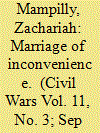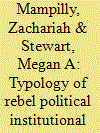| Srl | Item |
| 1 |
ID:
103121


|
|
|
|
|
| Publication |
2009.
|
| Summary/Abstract |
Scholars have shown how transnational forces can influence the behavior of belligerents in a civil war, dramatically altering the trajectory of the conflict. The breakdown of the peace process in Sri Lanka, less than a year after the Asian tsunami, has led many to question the relationship between the disaster and the return to war. In this paper, I explore the complex relationship between Liberation Tigers of Tamil Eelam (LTTE) governance structures and the international community, arguing that post-tsunami relief efforts closed the door to a negotiated settlement by contributing to the insurgency's failed play for autonomy from the Sri Lankan state upon which it had long been reliant for assistance in governing the civilian population in the northern and eastern provinces of Sri Lanka. Through a detailed case study of the micro-level impacts of a massive spike in foreign aid on the organization of a long-running insurgency, the paper is able to assess the merit of the 'substitution effect' posited by scholars that argues that foreign aid can allow rebels to ignore civilian concerns in favor of a purely military focus. While generally supportive of this argument, the paper complicates the picture, demonstrating the importance of understanding local contexts for the international relief apparatus that continues to serve as the primary response to disasters, both natural and man-made.
|
|
|
|
|
|
|
|
|
|
|
|
|
|
|
|
| 2 |
ID:
159207


|
|
|
|
|
| Summary/Abstract |
Do shifts in global power affect the performance of United Nations peacekeeping? While many have studied the impact of rising powers on the global economy, none examine how they impact the structure of the UN’s peacekeeping institutions. By engaging in a multi-level analysis, this article links the ascendance of India with the decreased performance of the UN Stabilization Mission in the Democratic Republic of Congo (MONUSCO). By examining the performance of Indian peacekeepers in Congo before and after India’s ascension to a seat on the Security Council in 2011, the article illustrates the specific mechanisms through which India’s shift on peacekeeping undermined the performance of the mission in North Kivu. Drawing on interviews in Congo and India, the article links India’s machinations within the Security Council over the Libyan intervention to the reduced performance of MONUSCO. Specifically, India’s decision to withdraw military hardware from the mission and to end reforms designed to improve relations between peacekeepers and Congolese civilians undermined its ability to fulfill its primary mandate of civilian protection. The analysis suggests that the once firm boundary between troop-contributing countries and those that pay for missions is increasingly unstable with negative consequences for civilian protection.
|
|
|
|
|
|
|
|
|
|
|
|
|
|
|
|
| 3 |
ID:
177011


|
|
|
|
|
| Summary/Abstract |
What are the different political institutions rebels create to engage captive civilian populations, and how do they arrive at distinct political arrangements? Rebel-controlled territories host a diversity of political institutions ranging from structures designed to promote democratic decision-making to martial law. Although previous research has focused on rebel social service provision and other aspects of rebel governance, few have investigated variation in the institutional arrangements rebels adopt. In this article, we identify a set of four dimensions along which rebel political institutions vary leading to six ideal–typical forms of political arrangements. We argue that an iterative and dynamic stepwise process, determined by rebel group strategies and local conditions, produces one of these political institutional outcomes. Importantly, the type of rebel political institutions within one location can change throughout the war, and variation sometimes emerges across territories the same rebel group controls. We demonstrate the plausibility of our arguments through a series of illustrative case studies that correspond to the formation processes of our six ideal–typical political arrangements. We conclude with recommendations for future research.
|
|
|
|
|
|
|
|
|
|
|
|
|
|
|
|